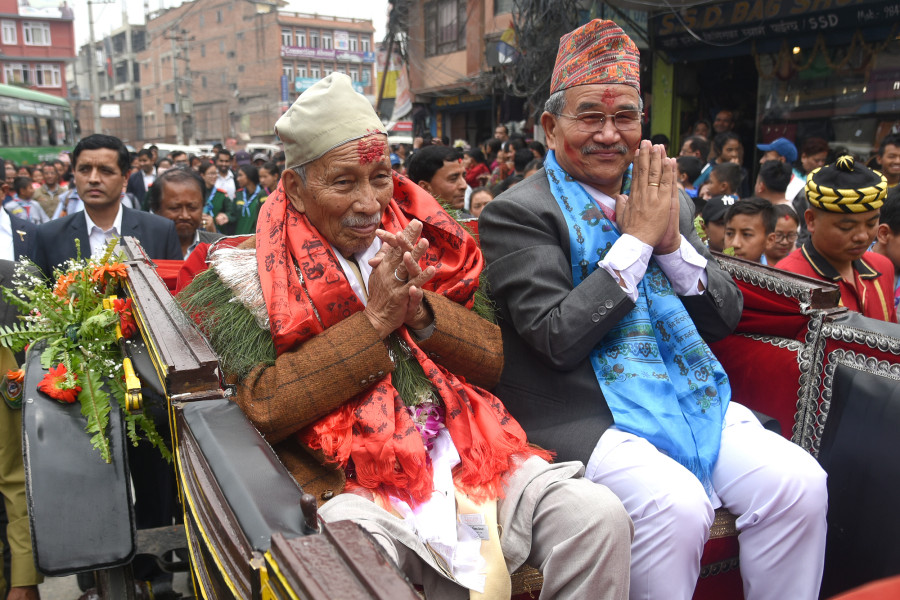Valley
Lalitpur marks cultural institution Satya Mohan Joshi’s hundredth birthday
For Satya Mohan Joshi, living a hundred years is not a difficult thing; it is simply a matter of refraining from negativity.
Anup Ojha
For Satya Mohan Joshi, living a hundred years is not a difficult thing; it is simply a matter of refraining from negativity.
“I never complain,” said Joshi at a Monday event organised to mark his hundredth birthday. “Instead, I contemplate life and get energy from my best wishes.”
Joshi, an institution all by himself, was characteristically full of vigour, striding across the Lalitpur Metropolitan City garden to the podium with the gait of a man half his age.
In Lalitpur, his hometown, Joshi is beloved like few others. The city had declared a holiday and the streets, from Patan Durbar Square to Pulchowk, were lined with locals marching to the tunes of traditional Newar music.
Cultural conservationists, literature lovers, art enthusiasts, teachers and students all paid tribute to Joshi, a three-time recipient of the Madan Puraskar, for his work on folk studies, Nepali numismatics and the traditions of the Karnali region.
But everyone was wondering just how Joshi had managed to stay so fit all these years. His physical appearance belied his age, and his voice betrayed few signs of a hundred years of life.
“If you know how to control your food habits, you can live a longer life,” said Joshi, as if to answer unasked questions from the audience. “I take one peg of alcohol before I go to bed. I am habitual. I don’t take more than one peg. Alcohol is very important for energy, but one should not over-consume it.”
Chiri Babu Maharjan, mayor of Lalitpur, inaugurated Monday’s programme, where Joshi was placed on a chariot and led on a procession around Patan’s Mangal Bazaar area.
Joshi’s contributions to Nepali culture, history and literature are immense. He is something of a renaissance man, having authored over 50 books on music, history, culture, literature and drama. His numerous books have been hailed for their prescience and he is considered one of the last living doyens of Nepali culture and history. Many experts in their field consider Joshi’s knowledge of language, music and traditional rituals unsurpassed. Joshi also founded the Rastriya Nach Ghar and has been honoured with an honorary Doctor of Literature degree by Kathmandu University.
“Joshi is a national treasure,” said Jagman Gurung, vice-chancellor of the Nepal Academy of Music and Drama. “He is a sage, and he cannot be limited to a certain community, class or group.”
Joshi was in a jovial mood, speaking to a long life lived well.
“Even Laxmi Prasad Devkota didn’t live longer than 50 years. I myself am amazed at how I survived for so long,” Joshi wondered out loud. He claimed that he has never been to the hospital, except for once when he had breathing difficulties and chest problems in 2014 and was admitted to the Balkhu-based Vayodha Hospital.
“Only national poet Madhav Ghimire, who is seven months older than me, is still alive,” said Joshi.
Numerous public personalities were present at the event, a testament to Joshi’s standing in society. Provincial Assembly Member Jeevan Khadka, Standing Committee member of the Nepal Communist Party Pampha Bhusal, Indian Ambassador to Nepal Manjeev Singh Puri, and Mayor of Kathmandu Metropolitan City Bidya Sundar Shakya, including others, were in attendance.
“Joshi is an ideal personality for the new generation,” Ishwor Pokharel, deputy prime minister and defence minister, said at the Lalitpur event. “If we can all walk on the path shown by Joshi, we will definitely lead our country to prosperity.”
Alongside Joshi, the city also felicitated four other centenarians from Lalitpur—Bhai Raja Maharjan of Ward 6, Sita Bhandari of Ward 22, Panchamaya Bajracharya of Ward 16, and Ratna Man Shrestha of Ward 11.
In concluding his address, Joshi was circumspect about his life, thanking the gathered crowd for their love, respect and motivation, and expressing a desire to live for two more years.
“Death is inevitable,” said Joshi. “We all are carrying death with us. If you know this intractable fact, you can live longer.”




 22.17°C Kathmandu
22.17°C Kathmandu.jpg)















